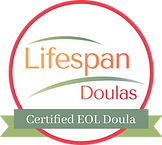top of page

FAQs
LISTEN TO CONVERSATIONS ABOUT END OF LIFE
featured articles

The Rise of the Death Doulas
"Only two adventures are guaranteed for all humans: life and death. These inevitable transformative events are marked by both supreme beauty and ultimate intensity, and they are not meant to be confronted in isolation..."

Enabling Truth to Exist
"I bear witness to the quiet unravelling that happens when life begins to let go. I invite reflection, for curiosity, and for the discomfort that often arrives when we start to sense—viscerally—that
something is ending.

I decided to build my own coffin.
here’s how i did it.
"It still hasn’t sunk in that I will be building my own coffin, until Tamara, the builder,
asked me for my height. Of course the coffin is made to fit just me. So we began.."
- Mary Gidney
bottom of page










